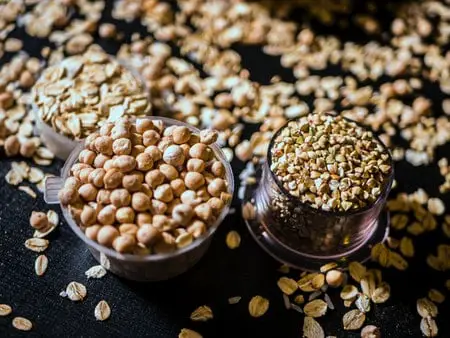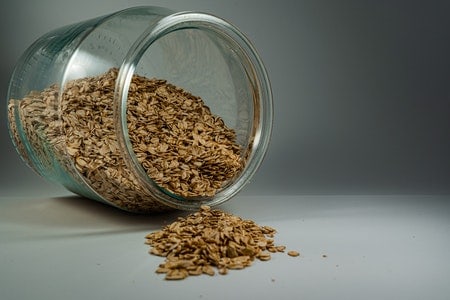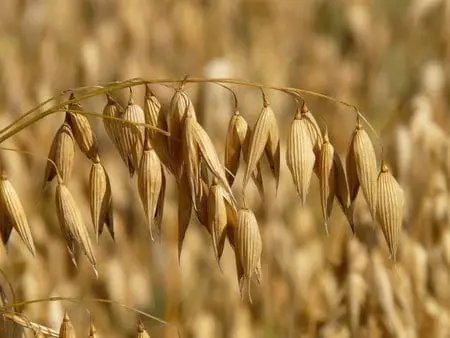Oats are a nutritious, all-natural food for horses. When fed in moderation, oats can provide your horse with essential nutrients and will not cause any digestive problems. Many owners feed their horses oats to help them maintain body weight and condition during the winter months when there is less hay available.
Oats should never be fed as the only source of nutrition because they do not contain enough protein for this purpose.
If you want to supplement your horse’s diet with oats then it is important that you give him access to plenty of fresh water at all times while he eats his meal. The addition of grains like barley, cornmeal, or even whole wheat will increase the nutritional value of the oat mixture and make it easier to consume.
Horses have had oats as an integral component in their diet for decades. Oats are often seen to be safer than other grains like corn and barley due to their milder flavor.
Types of Oats Fed to Horses
The benefits of oats are limitless. Oats have been grown in Europe, Canada, and the United States for centuries. They’re a great source of protein, antioxidants and they provide you with all nine essential amino acids!

Some of the oats that horses often feed on include;
- Crimped oats
- Rolled oats
- Whole oats
- Crushed oats
Nutrients In Oat Horse Feed
Feeding oats to your horse can be a good idea, but it depends on what you’re feeding them for. If you are looking for weight gain, then oat-feeding is an excellent choice! But if preventing metabolic problems (such as laminitis), the best option would be low starch feed containing between 11 and 14% of total dry matter.
For horses to be at their best, they need a diet that contains the right amounts of calcium and phosphorus. Oats are usually high in phosphorus but low in calcium which can lead to health issues for your equine pal!
Oats have natural nutrients that help with your horse’s digestion and can even reduce the likelihood of colic.
Oats are high in protein, carbohydrates, and fiber which can help with weight control. Oats also contain B-vitamins such as thiamine and riboflavin that help the horse’s metabolism work efficiently.
The most important nutrient found in oats is calcium which helps to build strong bones and teeth. Oats also contain iron which helps deliver oxygen to the muscles all day long!
Oats are traditionally thought of as a “low-starch” grain, but it’s only low starch when compared to corn. Oats contain 30% – 40% starch and the digestibility is higher than that found in other grains.
Are Oats Good for Horses
When it comes to choosing the right food supplement for your horse, oats are an excellent choice. They have a higher fat and fiber content than most other grains so they’re digested faster with less chance of sugars reaching their large intestine. Plus, because horses need calories to run long distances on race days or even just during exercise if you’ve been working them hard all week – they’ll get these from oatmeal!

With the right knowledge and determination, it is possible to reap all of the nutritional benefits that oats have to offer without having an adverse effect on your horse’s diet.
Those who feed their horses oats on top of a commercial diet should be aware that this can alter the key ratios in your horse’s body, namely calcium/phosphorus. For those who rely on feeding their horses hay, an easy way to evaluate if adding some oats will be helpful is to first consider what is being eaten by your horse besides commercial food, but most importantly whether or not they are getting enough nutrients.
You want your horse to be as healthy and energetic as possible, but it is not always easy. The key is finding the right balance of nutrients that will keep them feeling their best without over-feeding or under-nourishing them.
Feeding Oats to Horses – Key Benefits
- Oats are a great source of fiber, which can help with digestive issues and weight gain
- The high starch content in oats is an excellent energy source for horses
- Oats are a low-cost feed option that can be used to supplement other feeds
- Feeding oats helps prevent metabolic disorders such as laminitis and founder
- Horses fed oats have better overall health than those who don’t eat them
- Horses fed oats may experience fewer dental problems like tooth decay or gum disease because of the high level of calcium in oat bran
Downsides to Feeding Oats to Horses
Oats are an important part of a horse’s diet, but they can be difficult to digest. The type and quality play a large role in how the oats break down inside your horse’s body.
Whole oats or rolled oats often need more processing, so crushing or de-hulling makes it easier for digestion. Whole oat grains with their intact husks will take longer to go through your horse’s digestive system without providing any nutrition benefits.

The risk is when the undigested starch in oats reaches the hindgut, they begin to ferment and produce a lot of lactic acid. This process diminishes many good microbes that are responsible for breaking down fiber into smaller pieces which can be more easily digested by other organisms. When this happens, the pH level lowers because it becomes increasingly acidic as time goes on.
When acidity levels in the hindgut get too high, it kills off any good microbes. These toxins can cause myriad health problems like digestive imbalance and colic.
What to feed horses to gain weight
Horses need to eat a lot of food in order to get enough nutrients. When they are not getting enough, it can lead them to be underweight and unhealthy. It is important for horse owners to understand what kind of food their horse needs in order for them to gain the appropriate amount of weight.
Choosing a quality, natural horse feed is important for the health of your best friend. A complete feed should provide balanced nutrients and be easily digestible in an easy-to-handle form with good ingredients like prebiotics that help horses stay healthy by altering their gut flora to improve nutrient absorption.
Look for feeds containing oats processed into Mannan Oligosaccharides (MOS); flaxseed oil rich in omega 3s which are great brain food; beta-glucan stimulates immunity; polar lipids have anti-inflammatory properties perfect for soothing sore joints or muscles.
Oats can also offer threonine (helps restore muscle protein) and valine (good source of energy)—the two amino acids most crucial when in the recovery phase.
Feed your horse a diet that is high in forage (e.g., pasture and hay) at least 24 hours per day, but not too much grain or complete feeds to disrupt their digestive system. Instead of focusing on the amount you feed them, make sure they are getting all necessary nutrients by providing specially prepared weight gain.
Food with protein from animal sources like beef meat meal and fat from vegetable oils as well as carbohydrates such as beet pulp or corn oil meal pellets will help regulate bowel movements while being digested more slowly than normal grains.

